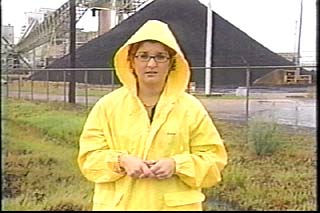KXAN's Aluminum Siding
KXAN does publicity work for Alcoa, disguised as news reporting.
By Michael King, Fri., Sept. 21, 2001

On August 29, KXAN-TV (Ch. 36, Cable 4) ran a commercial for Alcoa Corp. on its 10pm news show. Normally, this wouldn't be noteworthy -- except that the commercial was ostensibly part of the newscast. Under the headline "Alcoa Protest," the brief report was devoted almost exclusively to Alcoa Rockdale's personal presentation -- via company spokesman Jim Hodson and Sandow mine manager Tom Hodges -- of the company's record on mining, land reclamation, and air pollution control.
The only mentions of the widespread "protests" against Alcoa came at the beginning and end of the report: When anchor Robert Hadlock introduced the story and then again when reporter Donna Rapado signed off, with "So far, hundreds of residents [in Lee and Bastrop Counties] oppose the [mining] project." Otherwise, the KXAN report presented without question or comment the Hodges/Hodson version of Rockdale's operations: that the mining does not harm the land or the water, that the company's land reclamation returns the countryside to its original condition or better, and that Alcoa's newly announced pollution reductions will soon end Alcoa Rockdale's continuing role as the single largest point source of grandfathered air pollution in the state (annually more than 900,000 tons of toxic emissions -- which Rapado described as "more than 100,000 tons"; see "Neighbors vs. Neighbors" in the July 27 Chronicle).
We were puzzled by this story, particularly since KXAN's Rapado has done good work on the Alcoa beat. And just the night before, on Tuesday, Aug. 28 -- sheer coincidence, no doubt -- the Bastrop County commissioners had met to consider Alcoa's request that several county roads be moved for its proposed Three Oaks mine (the specific community objections went unmentioned in Rapado's next-day report). So we called Rapado and asked her how it happened that her Wednesday report seemed such a credulous representation of Alcoa's version of reality.
Rapado said that she's been "covering Alcoa for the last few months, covering both sides [of the story], sporadically. It's not like the newspaper, where you have five pages to say everything." She added, "If you watch the piece correctly, it wasn't saying that Jim Hodson was right, but that Jim Hodson 'says' these things. I wasn't giving any value to it -- the attribution was there." Rapado said she's done other stories on the citizen protests and on Texas Natural Resource Conservation Commission reports concerning Alcoa. None of that, she implied, needed to be repeated in her Aug. 29 report as counterweight to Alcoa's Pollyannish review of its own record.
Rapado referred further inquiries to KXAN assignments editor Jim McNabb, who responded -- like many journalists to simple questions about their reporting -- with the telephone manners of a bill collector (or maybe it's just us). "You're doing a story about a story?" he asked. Yes, it's called media coverage. "Well, has there been any attempt on your part to see our other coverage about the TNRCC and so on?"
Although we were going to suggest that it was a bit much to expect his viewers to maintain a videotape anthology of all KXAN reports on Alcoa, McNabb didn't wait for a response. "Donna covers the river valley -- that's what they call it out there. We had been to many of the town hall meetings [on the proposed mine], and the Alcoa people called and said, 'Come up and take a look at what we're doing.' All we had was aerials [aerial photos] of the mine area, so we thought that in fairness we should go out and show the operation itself. We try to produce balanced stories and have balanced reporting."
Asked if he thought this particular story met that standard, McNabb said yes -- because they had previously done other stories that covered the protests. "It's kind of like political coverage," he said. "If Y candidate is in town, people complain, 'Why didn't you talk to X candidate?' The answer is, because X wasn't in town. You hope -- no, you intend -- that at the end of campaign the coverage is balanced. And that [Alcoa] story is part of continuing coverage of the story."
If we heard McNabb right, we suppose that means that the residents of Lee and Bastrop Counties -- not to mention any independent experts on Alcoa's mining and pollution record -- were all out of town on the day Rapado dropped by. "There is never any bias in any of this reporting," insisted McNabb. "All [we're] presenting is the facts."
So if some air-hugger should make on-air assertions about Alcoa's continuing pollution of the countryside, would McNabb not bother to ask for Alcoa's response until, oh, weeks later -- or as quickly as Alcoa's lawyers can pick up a cell phone?
From McNabb's television universe, he insisted yet again, "For that day, the story was balanced." Then again, "I question the writing of a story about a story."
We heard him the first time.
Got something to say on the subject? Send a letter to the editor.








